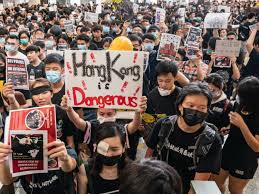Jaime Chu at The Baffler:
 If at the beginning of the crisis in Hong Kong, three months ago, it was hard for some to imagine how a supposedly democratic conclave within authoritarian China and the pride of imperial capitalists everywhere would soon become the undeclared police state it now is, it’s an even bigger challenge to imagine how the political crisis might be resolved without a dramatic redefinition of the relationship between the semi-autonomous territory and Beijing’s dictatorial central government. The movement—the revolution, the rebellion, the resistance, the terrorism, the uprising, whatever it is called, depending on who you ask—started as a protest against an extradition bill that, if passed, would have left the door open to compromising Hong Kong’s judicial independence from mainland China’s opaque legal system, in turn accelerating the collapse of the former British colony’s administrative autonomy and the personal freedom of its citizens. The bill had refreshed in everyone’s mind protests against controversial high-speed railway construction in 2009, ill-founded electoral “reform” by Beijing that failed to deliver universal suffrage as promised and triggered the Umbrella Movement in 2014, and the abduction of five liberal local booksellers by the Chinese government in 2015.
If at the beginning of the crisis in Hong Kong, three months ago, it was hard for some to imagine how a supposedly democratic conclave within authoritarian China and the pride of imperial capitalists everywhere would soon become the undeclared police state it now is, it’s an even bigger challenge to imagine how the political crisis might be resolved without a dramatic redefinition of the relationship between the semi-autonomous territory and Beijing’s dictatorial central government. The movement—the revolution, the rebellion, the resistance, the terrorism, the uprising, whatever it is called, depending on who you ask—started as a protest against an extradition bill that, if passed, would have left the door open to compromising Hong Kong’s judicial independence from mainland China’s opaque legal system, in turn accelerating the collapse of the former British colony’s administrative autonomy and the personal freedom of its citizens. The bill had refreshed in everyone’s mind protests against controversial high-speed railway construction in 2009, ill-founded electoral “reform” by Beijing that failed to deliver universal suffrage as promised and triggered the Umbrella Movement in 2014, and the abduction of five liberal local booksellers by the Chinese government in 2015.
more here.
